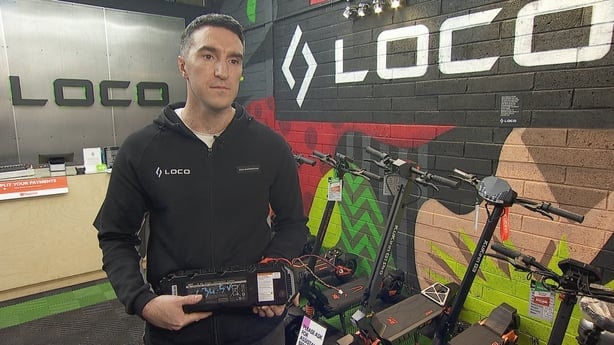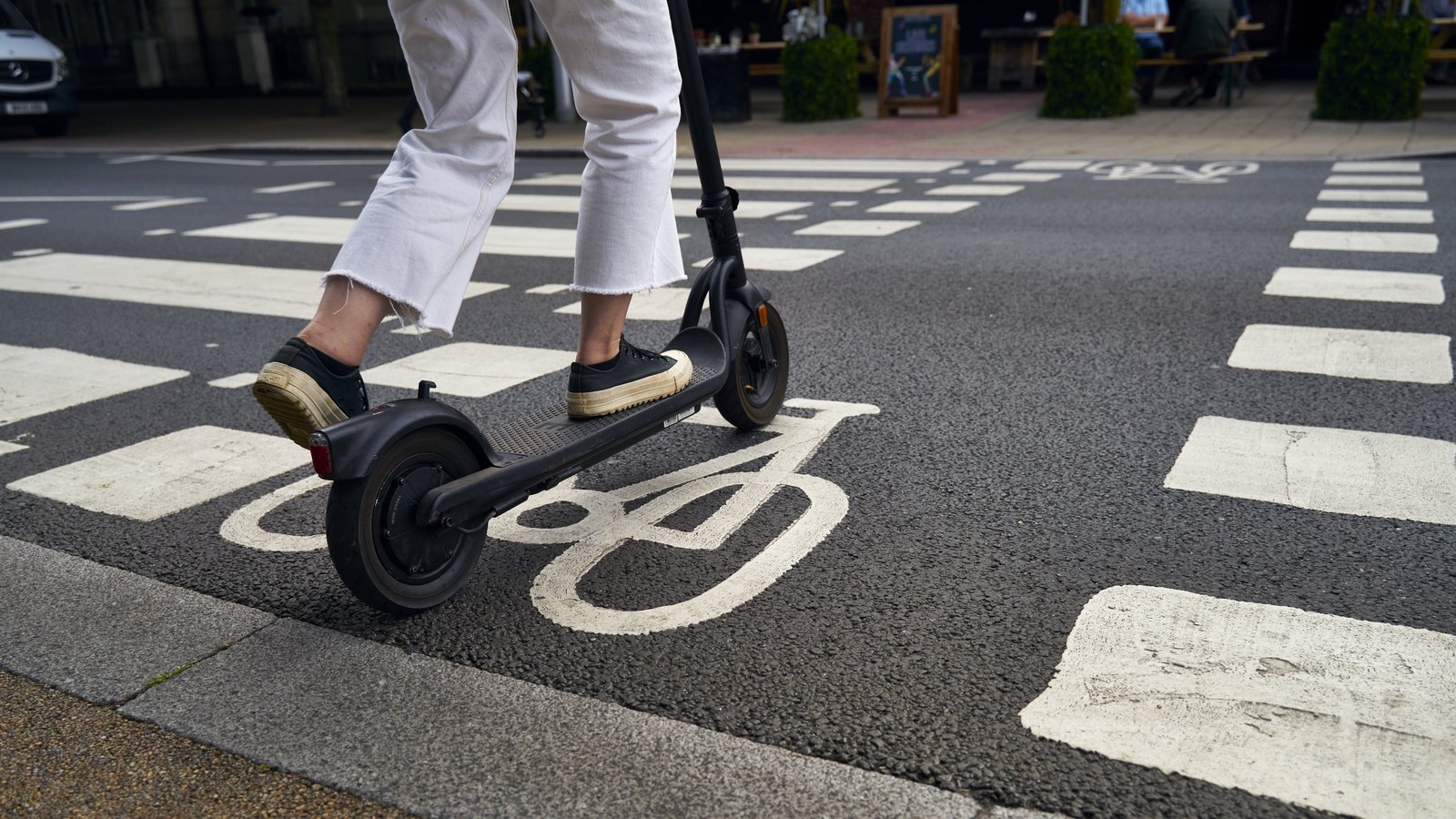People will not be able to take e-scooters on public transport from tomorrow, over fears that the batteries used in them could catch fire.
The National Transport Authority (NTA) has said the lithium-ion batteries are known to develop internal faults, which can lead to overheating and combustion.
Based on guidance issued by the NTA earlier this year, public transport operators will, from tomorrow, prohibit the carriage of e-scooters on buses and trains, including those that can be folded or carried.
The restriction does not apply to e-bikes or mobility scooters.
“E-scooters are a relatively new product and were unregulated in Ireland until earlier this year,” the NTA said in a statement.
“The quality control of their construction is therefore not as mature or well developed as e-bikes and mobility scooters, which have been regulated for longer.
“The tested batteries of e-bikes and mobility scooters do not pose the same level of risk.”
The NTA also said the position of the batteries on the e-scooter platform makes them more susceptible to physical damage, than in the case of e-bikes.
Recent fires on board public transport in Madrid and Barcelona have also prompted the guidance, the NTA said.
Similar restrictions are already in place in Berlin, Barcelona, and the UK, it added.
They apply to all services operated under a contract with the NTA, including Dublin Bus, Bus Éireann, Go-Ahead Ireland, Iarnród Éireann, Luas and TFI Local Link.
The implementation and enforcement of the ban will be the responsibility of individual transport operators. The NTA said the guidance is subject to periodic review by the NTA and transport operators.
The National Bus and Rail Union (NBRU) has welcomed the move, saying it will protect drivers and passengers.
It said members have voiced serious concerns amid reports of incidents involving e-scooter batteries on buses and trains across Europe.
The hands of the trade unions and transport companies are tied when it comes to making decisions about allowing or prohibiting e-scooters on public transport, the NBRU said, adding that policy is dictated by the Government and the NTA.
“Consequently, drivers find themselves not only managing the complexities of these policies, such as instructing passengers to fold their scooters and overseeing and managing luggage compartments, but also confronting the very real dangers posed by battery combustion and the potential for deadly fires on buses and trains.
“The technical aspects of e-scooter batteries further complicate this issue.
“Higher energy capacities result in increased watt hours, which in turn extend the range of electric scooters for a given motor size.
“Given the impracticality of policing battery capacity on public transport, a complete ban on the carriage of e-scooters emerges as the most effective solution.
“Safety must be our utmost priority, and the NBRU fully supports the ban on e-scooter transport to protect drivers and passengers alike from the risks associated with these devices.”
The ban will lead more people to take their cars on their daily commute, Dublin Commuter Coalition has said.
“Campaigners have been working for many years to get them [e-scooters] legalised, and the public have since gone out, in good faith with Government and purchased them as last-mile solutions over the past number of months.
“To have them so suddenly banned will likely force some people back into the car as it may be the only other option for their journey.
“All e-scooters sold within Ireland are required to meet the EU’s stringent safety standards.”
Dublin Commuter Coalition is urging the NTA to consult with experts, industry representatives and campaigners to expedite the removal of e-scooter restrictions and prevent a “rolling unexplained ban”, it said.
Leading retailer says ban ‘makes no sense’
As well as being Ireland’s largest e-scooter retailer, Loco Scooters also provides repair services for the vehicles.
Its co-founder Paddy O’Brien said his business has repaired just under 10,000 scooters in the last three-and-a-half years, and none has been repaired due to lithium battery fires.
“Our business is going into its fifth year now, and our repair centre has been in full flight maybe three-and-a-half years, and we’ve done just under 10,000 repairs in that time.
“Lithium battery fires are fortunately not something we have had to repair here before.”

He said he understands the concerns but believes the ban is excessive.
“We get that it comes from what people feel are validly held concerns in relation to safety on public transport, but this bogeyman of electric scooters simply bursting into flames is not something that we’ve seen through vast experience over a number of years.”
Mr O’Brien believes it “makes no sense” to ban e-scooters from public transport while allowing e-bikes to be brought on board, as the batteries used in both vehicles are “so similar”, he said.
“The fact that electric bikes continue to be allowed on public transport – there’s a juxtaposition there between the two things.
“The batteries are the same, if not similar, across both modes of transport.
“They’re the same lithium-ion cells … and there would be very little difference between the two, so it makes no sense that one and not the other is allowed to be on public transport.”
At Dublin’s Connolly Station, some passengers gave their views.
Scooter owner, Gavin Walsh said: “Scooters allow for shorter journeys, especially for the small things like one or two stops.
“Scooters and bicycles fit a niche that no other transport does, and that is why they are important.
“If you want to make a connection from the Dart, from the Luas, from the bus, you need something to bridge that gap. And that isn’t really there at present.”

“I think it’s a bit silly. Having a full ban on them is a bit wrong,” said Iara Moreira.
“If there is a danger with the batteries … it’s worth just having a limit on the number of scooters and other things that might have those dangerous batteries in them,” she added.

Dylan Fitzpatrick said: “It [the ban] makes sense, because they are combustible.
“If they were to go off it would create a huge incident on the train, so I don’t see any problem with it. You only need one or two to go on fire, so maybe converting to manual scooters would make more sense.”


